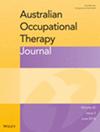Student-led activities of daily living group program in a hospital inpatient rehabilitation setting
Abstract
Introduction
Occupational therapists have vital roles in inpatient rehabilitation to focus on independence in activities of daily living. Occupational therapy interventions are uniquely designed to address goals of service users and can be delivered individually or in group formats. Group interventions promote service users' mutual support and enable therapists to increase frequency and intensity of service provision. Student-led programs have become an attractive model, benefiting students while providing positive treatment outcomes for service users. There is an emerging body of literature that explores service users' and students' satisfaction with student-led group models of practice within inpatient rehabilitation and occupational performance outcomes of service users participating in student-led programs. This study aimed to explore the satisfaction of service users and students in addition to the self-reported occupational performance outcomes of a student-led activities of daily living group program in inpatient rehabilitation.
Methods
Data from 33 service users and seven students were collected retrospectively. The intervention involved a student-led activities of daily living group program, consisting of three groups: breakfast, morning tea, and home readiness group. All service users and students completed unique satisfaction surveys at the conclusion of their participation in the student-led program. Service users completed a self-reported activities of daily living performance measure pre- and post-program. Findings were reported in descriptive statistics, and pre- and post-program data were compared with the Wilcoxon signed-rank test.
Results
All students were satisfied with the student-led program. Majority of service users were satisfied with all components of the student-led program. Median scores for self-reported performance increased significantly following the student-led program (P < 0.001).
Conclusion
This study highlighted that service users and students were satisfied with the service delivery of a student-led activities of daily living group program. The program was effective in addressing self-reported performance for service users in inpatient rehabilitation. The findings from this study have potential to inform clinical practice on the implementation of student-led programs in occupational therapy settings.

 求助内容:
求助内容: 应助结果提醒方式:
应助结果提醒方式:


